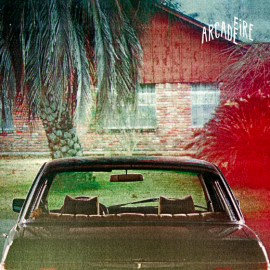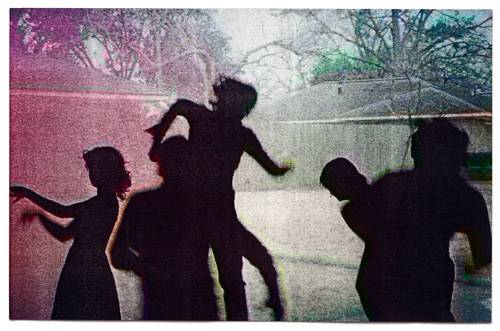 While securing the black, leather headphones over my ears and preparing to listen to Arcade Fire’s new album, The Suburbs, I realized I was holding the Montreal based indie rock band to a pretty high standard. And let’s be honest, they deserve it. With their first major release, Funeral (2004, Merge Records) commonly hailed as a modern classic, and their second album, Neon Bible (2007, Merge Records) receiving widespread critical acclaim and debuting at number one in both Canada and Ireland, it’s clear that the group consistently produces strong, influential work that is not to be swept aside. So, needless to say, I was hoping for something as emotionally gripping as the band’s previous two albums, and what I received was something both gorgeous and wretched.
While securing the black, leather headphones over my ears and preparing to listen to Arcade Fire’s new album, The Suburbs, I realized I was holding the Montreal based indie rock band to a pretty high standard. And let’s be honest, they deserve it. With their first major release, Funeral (2004, Merge Records) commonly hailed as a modern classic, and their second album, Neon Bible (2007, Merge Records) receiving widespread critical acclaim and debuting at number one in both Canada and Ireland, it’s clear that the group consistently produces strong, influential work that is not to be swept aside. So, needless to say, I was hoping for something as emotionally gripping as the band’s previous two albums, and what I received was something both gorgeous and wretched.
The opening track, entitled, “The Suburbs,” begins with a heavy, honky tonk piano line more to be expected from Wilco than Arcade fire. To contrast the lively melody, we hear Win Butler sing in his usual mournful style, but something about its quality, (or even its volume) suggests a more reserved performance compared to the bands previous work. The music then drifts from its bouncy, piano-dominated intro, into a bleak drone of violins evoking feelings of regret and loss, while Butler, in a quiet falsetto, sings the lyrics, “Sometimes I can’t believe it/ I’m moving past the feeling.” The song ends in a wave of ambient vocal and string harmony, gently handing itself over to the albums second track, “Ready to Start.”
I found this song reminiscent of the punchy, rhythmic style heard on Neon Bible’s “Keep the Car Running.” Its fast paced, catchy bass line heading the foreground along with its sharp synthesizer melody used tastefully in the background, certainly make this a memorable track. The band also makes good use of white noise, suggesting images of television sets in well-furnished living rooms, and streets lined with single-family homes.
The album’s third track, “Modern Man,” intelligently matches its music to its lyrics. We hear Butler honestly question Western views on attaining happiness. “I know we are the chosen few,” he sings wearily, “but were wasted/ and that’s why were still waiting.” The music is lead by a wan, redundant guitar line, making one feel as if they’re trapped in an elevator, or a waiting room.
The first act of the album is closed off with “Rococo,” a strong baroque anthem damning and empathizing with the youth of the modern generation. Violins wail helplessly in the background, as Butler sings bitterly, “They seem wild, but they are so tame.” The chorus is a raucous chant of, “Rococo” over and over again, sealing off the beginning of “The Suburbs” in a bombastic, memorable manner.
The middle of the album is significantly weaker than the beginning. It is far less consistent, and while there are many gripping, powerful songs, there are many more that leave one feeling agitated and disappointed.
I felt one of the stronger songs in this section was “City with No Children.” A poppy vocal melody with a heavy bass line comprises the majority of the music, but where the song really shines is in the lyrics. While Arcade Fire usually has decent lyrics (good, not great) this song held as an exception. We hear Butler sing such gems as, “you never trust a millionaire quoting the sermon on the mount/ I used to think I was not like them, but I’m beginning to have my doubts, “ and “do you think your righteousness could pay the interest on your debt?” It’s in this song we hear thoughts surrounding Butler’s struggle with morality in an insane, and deadened world vocalized, making this track a winner on the album.
The weakest track in this section (and perhaps on the entire album) is “Month of May.” This is a hard, edgy rock song, with hints of punk found in the fuzzy guitar work and bold, but simplistic drumming. My main problem with this track was that any band with a basic knowledge of power chords and lyric structure could have written it. In other words, the track lacks any originality whatsoever. Furthermore, the lyrics do nothing for the album as a whole. They seem to pay homage to the underground music scene, and to the process of making a rock album, but I wonder as to how this at all relates to the trying and emotional themes conveyed elsewhere.
 The album finally revives itself after an unfortunate period of mediocrity with the tracks “Sprawl I” and “Sprawl II.” In these songs we hear differing perspectives on the overall structure of the suburbs, and how it has emotionally affected both Butler, and Régine Chassagne. “Sprawl I” is a slow dirge sung by Butler, as he remembers revisiting his hometown and the loneliness it evoked within him. The guitar parts are distant and slow, while the drums serve only as ambient noise. In contrast, “Sprawl II” is a fast, catchy song, with a set of lyrics that are energetic, and hopeful on the surface, yet frightened and despairing beneath. Chassagne delivers an impressive vocal performance, which complements (even rivals) Butler’s, and may secretly be the strongest on the album.
The album finally revives itself after an unfortunate period of mediocrity with the tracks “Sprawl I” and “Sprawl II.” In these songs we hear differing perspectives on the overall structure of the suburbs, and how it has emotionally affected both Butler, and Régine Chassagne. “Sprawl I” is a slow dirge sung by Butler, as he remembers revisiting his hometown and the loneliness it evoked within him. The guitar parts are distant and slow, while the drums serve only as ambient noise. In contrast, “Sprawl II” is a fast, catchy song, with a set of lyrics that are energetic, and hopeful on the surface, yet frightened and despairing beneath. Chassagne delivers an impressive vocal performance, which complements (even rivals) Butler’s, and may secretly be the strongest on the album.
The album concludes with a reprise of the opening track, where we hear both Butler and Chassagne trade off verses stating how they do not regret their wasted time growing up in the suburbs, and if they could they would, “waste it again and again and again.” The track is thick with string parts and bold, yet resigned vocals. My only complaint is that it was too short, giving it the appearance of being tacked on the end in hopes of tying the album together thematically and artistically.
On the whole, I will say that The Suburbs at its best is reminiscent of the greatness heard on Funeral. The band has succeeded in altering its style in a way that makes the music fresh and enjoyable, yet not entirely foreign. The lyric work done on this album is some of the strongest yet from Arcade Fire, and hopefully this will continue into their later work.
However, I will also say that is album is certainly not perfect. Its lows are tough to get through, and unfortunately span three to four tracks at a time. Furthermore, the album was far too long. While I do love to hear that a band is producing copious amounts of work, I do not love it when much of the work put on an album is merely B-side material. Finally, I am torn on the issue of Butler’s revised singing style. I feel it a bold and respectful move on his part, (as he is allowing the other band members to stand out) but I felt myself missing his desperate wailings and laments found often on Neon Bible. In conclusion, the album is worth checking out, as it likely to be seen as one of the better albums of the year.








